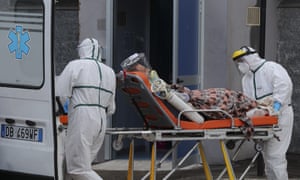Record daily infections in Germany; Naples hospitals at risk of being overwhelmed; France reports slowdown in rate of new cases
Paramedics take a Covid-19 patient to the Antonio Cardarelli hospital in Naples, Italy, for treatment. Photograph: Salvatore Laporta/IPA/Rex/Shutterstock
Germany’s partial lockdown could be extended beyond the end of the month and hospitals in parts of Italy are near breaking point as Covid-19 cases continued to surge in both countries, despite positive signs elsewhere in Europe.
New daily coronavirus cases in Germany hit a record of 23,542 on Friday, the Robert Koch Institute for infectious diseases reported, prompting government spokesman Stefan Seibert to say measures “were not expected to be relaxed” by next week.
Federal and regional leaders are due to meet on Monday to discuss whether the country’s closure of all gyms and entertainment venues has slowed the disease’s spread, but the health minister, Jens Spahn, said it was too early to say.
We will see in the next few days whether they are making a difference,” Spahn said. Winter gatherings and festivities such as office Christmas parties were in any event unlikely to go ahead.
Christmas markets, traditional St Martin’s Day parades and Germany’s carnival season, which should have started this week, have all been cancelled, while more than 300,000 school pupils are in quarantine along with about 30,000 teachers.
The southern Italian city of Naples, meanwhile, was braced for further restrictions as hospitals risked becoming overwhelmed by new cases, with medics forced to bring oxygen tanks outside to treat desperate patients waiting in their cars.
“The situation in Campania is out of control,” the Italian foreign minister, Luigi Di Maio, said after a video emerged showing an 84-year-old man dead in a hospital bathroom where he had been waiting for a Covid test. “We need urgent restrictions… people are dying.”
Hundreds of people from Campania have been travelling to neighbouring Lazio in search of urgent medical help as political wrangling continues over whether to impose a total lockdown in the region.
Campania is expected to be upgraded to the “red zone” from Sunday, meaning people will have to stay home unless going out for work, shopping or medical reasons, and bars, restaurants and most shops will close.
Italy’s alternative approach to the crippling nationwide lockdown it imposed during the first wave this spring has had little apparent success so far, with total infections passing the million mark this week and cases rising at more than 30,000 a day.
Confirmed cases in Portugal pushed past 200,000 with new daily infections reaching a record high of 6,653 and a new record of 2,799 Covid patients in hospital. A state of emergency due to last until 23 November is likely to be extended.
“When we reach the peak of the disease, it will still take weeks to see a drop in demand for hospitals and even more weeks to reduce the fatality count,” the health minister, Marta Temido, told a news conference.
The French prime minister, Jean Castex, on Friday said upcoming regional elections due in March should be delayed until June, a day after confirming the country’s two week-old lockdown would not be eased for at least another fortnight.
While the rate of increase continues to slow significantly, France has the fourth highest number of confirmed cases in the world, at almost 1.9 million, and the number of people in hospital with the coronavirus has reached a new all-time high of 32,638.
Castex said France could start to loosen restrictions from 1 December providing case numbers continue to fall, first by allowing non-essential shops to re-open. But bars and restaurants would not be permitted to resume operating until later still, he said.
Several European countries including France, Belgium, the Netherlands, the Czech Republic and Ireland have reported a slowdown in new infectionssince introducing strict new measures last month, but hospital services remain under severe pressure.
Ireland’s prime minister, Micheál Martin, said on Friday the country may embark on a staged approach after 1 December, with the aim of having restrictions eased by the run-up to Christmas “because I do get that people will want to meet with family”.
Elsewhere, however, infections continue to soar. Sweden recorded a record 5,990 new cases on Friday, its highest since the start of the pandemic, the national health agency said, as well as 42 new deaths taking its overall toll to 6,164.
The Scandinavian country, which has a Covid death tally per million inhabitants many times higher than its Nordic neighbours, is battling a second wave that health officials had hoped its light-touch, anti-lockdown approach would mitigate.
Russia, which has the world’s fifth largest number of cases, also reported a record 21,983 infections as Moscow prepared to close restaurants, bars and nightclubs on Friday between 11pm and 6am until mid-January in an effort to contain the pandemic.
Officials warned of raids and fines for establishments that do not comply. The capital has also moved university and college students to online learning and recommended that school children, already learning from home, keep travel to a minimum.
Beyond Europe, the virus is returning to New York City after it was in effect banished over the summer, with the city’s seven-day average of positive Covid-19 tests climbing to 2.6% on 11 November.
The governor, Andrew Cuomo, urged New Yorkers to “do their part” and “take this seriously” as officials started rolling back some reopenings, prompting fears of more dramatic lockdowns loom and possibly schools closures.
Post Views: 794

